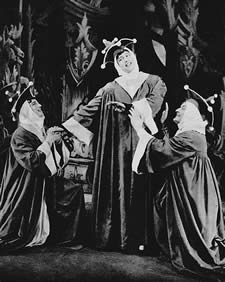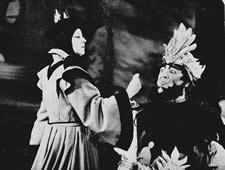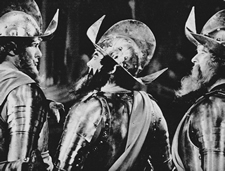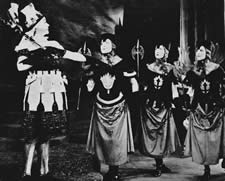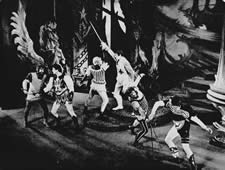 |
 |
||||||
Review from The Illustrated London News, 16 October, 1954 by J. C.
Trewin.
"Search throughout the panorama for a sign of royal Gama." We have been searching for a long time. It is, indeed, fifteen years since the last professional revival of Princess Ida; or, Castle Adamant. Very properly, it returns to the Savoy Theatre itself, and in a new scenic display of swoop-and-whirl-and-curlicue in which James Wade, the designer, keeps Ida from any specific time or place. This is, as it should be, a gay-go-up, gay-go-down world from the back of beyond: it is a pity that its costumes are sometimes more garish than becoming.
A colleague began his review by saying that few people bother today about The Princess, Tennyson's poem on which Gilbert based the dramatic parody from which Princess Ida is derived. Timidly now, I raise a finger. I still read the poem, and not only for its unmatched lyrics, "The splendour falls," "Tears, idle tears," "Now sleeps the crimson petal." Certainly the substance of the tale does not matter, the business of Ida, that determined feminist, and her women's academy. Even so, many lines cling to the memory, not least of them the young Prince's
| And then to bed, where half in doze I seem'd | |
| To float about a glimmering night, and watch | |
| A full sea glazed with muffled moonlight swell | |
| On some dark shore just seen that it was rich | |
and
| jewels five words long | ||
| That on the stretch'd fore-finger of all Time | ||
| Sparkle for ever. | ||
There are also unconsciously comic phrases:
| a herd of boys with clamour bowl'd | |
| And stump'd the wicket | |
and
| Hammering and clinking, chattering stony names | |
| Of shale and hornblende, rag and trap and tuff, | |
| Amygdaloid and trachyte...... | |
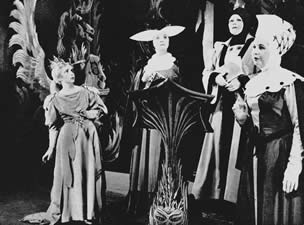 Princess Ida lectures the new students. |
Agreed, The Princess is not for all markets today; but it does remain an endearing poem, the work of a maker of the shining, melodious phrase. It has for me the charm of some half-forgotten, but agreeable, "folly" temple discovered at the end of a forest ride, "in the green gleam of dewy-tassel'd trees," or seen round the bend of a seldom-trodden path. Gilbert, in what he called his "respectful perversion" (1870), flattened the poem into a blank-verse jest that has some still amusing lines, but which must have seemed very much funnier at a time when The Princess was generally read, and the Laureate was in residence at Farringford or Aldworth. Its first hearers at the Olympic Theatre, remembering the Tennysonian catechism of Psyche:
| "Are you that little Psyche," Florian added, "she | |
| With whom I sang about the morning hills?..." | |
and so on, would have appreciated Hilarion's
| "Why, let me look. | |
| Are you that learned little Psyche who At school alarmed her mates because she called A buttercup "Ranunculus bulbosus"? |
|
That — the name of Hilarion was Gilbert's choice — reappears in the Savoy libretto fashioned from the parody when the partners were contemplating a successor to Iolanthe. The Olympic playgoers of 1870 would have found many reminiscences at the Savoy early in January 1884. In the libretto the blank-verse dialogue is hampering. It would have been better if Gilbert had reconsidered the plot instead of borrowing so extensively from his younger self. (He hated to waste anything.) But there are various lines that we recognise gladly ("I never knew a more dispensing chemist"), and at the Savoy now Ann Drummond-Grant is speaking with relish the jargon in which Lady Blanche wrestles with Abstract Philosophy. My favourite passage, which always reminds me of the plot of any play by Pirandello, is an 1884 addition:
The Present as we speak becomes the Past,
The Past repeats itself, and so is Future!
This sounds involved. It's not. It's right enough.
The lyrics of Princess Ida were, of course, new. Listening to them at the Savoy the other night, I realised again that our young librettists, revue wits, post-war phenomena, will have to go far before they can outdo the old master at whom it is fashionable to mock. Gama's "If you give me your attention, I will tell you what I am," is a model of its kind. In another mood, Hilarion's "Whom thou hast chained must wear his chain" — the first verse, at any rate — is something exceptional in light opera. And, at the Savoy, now, the numbers for Gama's sons. Arac, Guron, and Scynthius, are as engagingly mock-pompous as ever: "We are warriors three," "For a month to dwell", and the mock-Handelian "This helmet I suppose," with the removal of helmets, cuirasses, and brassets.
No doubt Princess Ida belongs more to Sullivan than
to Gilbert. It is a refreshment to hear the score at the Savoy, under Isidore
Godfrey's direction. Many of us, I feel, were thinking less of the "empyrean
heights" than of such incidental gaieties as the clanking of the three
musketeers (especially Donald Adams, whose Arac would have had, I fancy, the
friendliest of praise from the lamented Darrell Fancourt), and that early
song for Thomas Round's Hilarion, "Ida was a twelve-month old." Victoria
Sladen, from grand opera, seemed to me to be forcing the Princess. And elsewhere,
now and then, it was surprising in a D'Oyly Carte company to notice a blurring
of enunciation in both the sung and the spoken word. Here no one would fault
Peter Pratt, whose crab-apple Gama is precisely Gilbert's King "crumpled
in fitful petulance,"
with just a little of Tennyson's original (though one would vary the word
"bland"):
| crack'd and small his voice, | ||
| But bland the smile that like a wrinkling wind | ||
| On glassy water drove his cheeks in lines; | ||
| A little dry old man, without a star... | ||
Even if we cannot mark this present revival alpha plus, I am sure that Ida will soon fit again into the repertory as though it had never been dropped. In the middle reaches of the Savoy though it is, it can make much modern work (and by writers who gibe at Gilbert and Sullivan) seem tame and pallid. Not every Savoy-lover takes down his Tennyson before going to Ida. Let me suggest that your pleasure will be fortified if you glance at both the poem and the original (and not too respectful) "perversion". One passage remains more or less word-for-word in all three, the Princess's closing lines:
| We will walk the world | ||
| Yoked in all exercise of noble end! | ||
| And so through those dark gates across the wild | ||
| That no man knows. Indeed I love thee — Come! | ||
I wish that, at the Savoy, they were spoken better.
Page modified 16 August 2019
